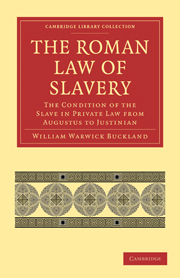Book contents
- Frontmatter
- PREFACE
- Contents
- ERRATA, ADDENDA, AND LIST OF ABBREVIATIONS
- LIST OF PRINCIPAL ABBREVIATIONS
- PART I CONDITION OF THE SLAVE
- PART II ENSLAVEMENT AND RELEASE FROM SLAVERY
- CHAPTER XVII Enslavement
- CHAPTER XVIII Enslavement (cont.)
- CHAPTER XIX Outline of Law of Manumission during the Republic
- CHAPTER XX Manumission during the Empire. Forms
- CHAPTER XXI Manumission during the Empire (cont.). Manumission by Will (cont.). Dies, Conditio, Institutio
- CHAPTER XXII Manumission during the Empire (cont.). Fideicommissary Gifts
- CHAPTER XXIII Manumission during the Empire (cont.). Statutory Changes
- CHAPTER XXIV Manumission under Justinian
- CHAPTER XXV Manumission. Special Cases and Minor Restrictions
- CHAPTER XXVI Freedom independent of Manumission
- CHAPTER XXVII Freedom without Manumission. Uncompleted Manumission
- CHAPTER XXVIII Questions of Status as affected by Lapse of Time, Death, Judicial Decision, etc.
- CHAPTER XXIX Effect after Manumission of Events during Slavery. Obligatio Naturalis
- APPENDIX I The relation of the contractual actions adiectitiae qualitatis to the Theory of Representation
- APPENDIX II Formulation and Litis Consumptio in the actions adiectitiae qualitatis
- APPENDIX III Form used by Slave in acquisition by Mancipatio, etc.
- APPENDIX IV The essential character of Manumission: Iteratio
- APPENDIX V Manumission vindicta by a, filiusfamilias
- INDEX
CHAPTER XXIV - Manumission under Justinian
Published online by Cambridge University Press: 07 September 2010
- Frontmatter
- PREFACE
- Contents
- ERRATA, ADDENDA, AND LIST OF ABBREVIATIONS
- LIST OF PRINCIPAL ABBREVIATIONS
- PART I CONDITION OF THE SLAVE
- PART II ENSLAVEMENT AND RELEASE FROM SLAVERY
- CHAPTER XVII Enslavement
- CHAPTER XVIII Enslavement (cont.)
- CHAPTER XIX Outline of Law of Manumission during the Republic
- CHAPTER XX Manumission during the Empire. Forms
- CHAPTER XXI Manumission during the Empire (cont.). Manumission by Will (cont.). Dies, Conditio, Institutio
- CHAPTER XXII Manumission during the Empire (cont.). Fideicommissary Gifts
- CHAPTER XXIII Manumission during the Empire (cont.). Statutory Changes
- CHAPTER XXIV Manumission under Justinian
- CHAPTER XXV Manumission. Special Cases and Minor Restrictions
- CHAPTER XXVI Freedom independent of Manumission
- CHAPTER XXVII Freedom without Manumission. Uncompleted Manumission
- CHAPTER XXVIII Questions of Status as affected by Lapse of Time, Death, Judicial Decision, etc.
- CHAPTER XXIX Effect after Manumission of Events during Slavery. Obligatio Naturalis
- APPENDIX I The relation of the contractual actions adiectitiae qualitatis to the Theory of Representation
- APPENDIX II Formulation and Litis Consumptio in the actions adiectitiae qualitatis
- APPENDIX III Form used by Slave in acquisition by Mancipatio, etc.
- APPENDIX IV The essential character of Manumission: Iteratio
- APPENDIX V Manumission vindicta by a, filiusfamilias
- INDEX
Summary
Many of Justinian's changes, not directly concerned with the law of manumission, had, indirectly, great effect upon it. It may be as well to enumerate the chief of these changes before stating the law systematically. He abolished the distinction between quiritary and bonitary ownership. He repealed the sc. Claudianum, with its connected legislation. He abolished the classes of latini and deditidi (thereby doing away with the rule that the slave must be 30, and with the restrictions as to criminal slaves who were freed), and he repealed the lex Fufia Caninia.
The rules in his time may be stated thus.
A. FORM. Census is gone. Vindicta remains, having long since ceased to be, if it ever was in any reasonable sense, a judicial process. Manumission in ecclesiis still continues. Manumission by will of course still remains. The general effect of legislation of the later Empire having been to abolish the praetorian will, the question whether freedom can be given by it is obsolete. The place in the will is now immaterial. Implied gifts are more freely recognised. Whatever may have been the earlier law it is now clear that appointment of servus proprius, as tutor, implies a direct gift of liberty. The rule is subject to some obvious restrictions. Thus, as it turns on an implication of intent, the rule does not apply where the facts negative this intent, e.g. where the testator thought the slave free. And where the slave is appointed cum liber erit, the appointment is a mere nullity.
- Type
- Chapter
- Information
- The Roman Law of SlaveryThe Condition of the Slave in Private Law from Augustus to Justinian, pp. 552 - 572Publisher: Cambridge University PressPrint publication year: 2010First published in: 1908



